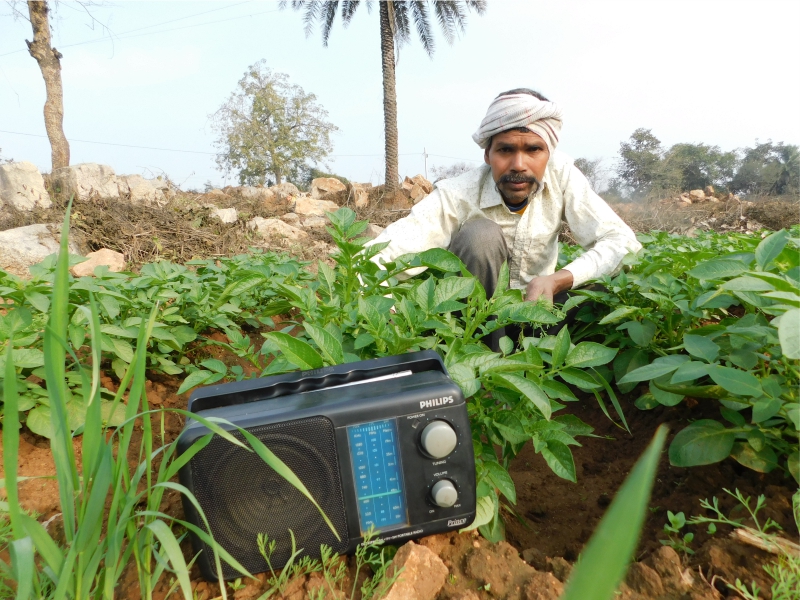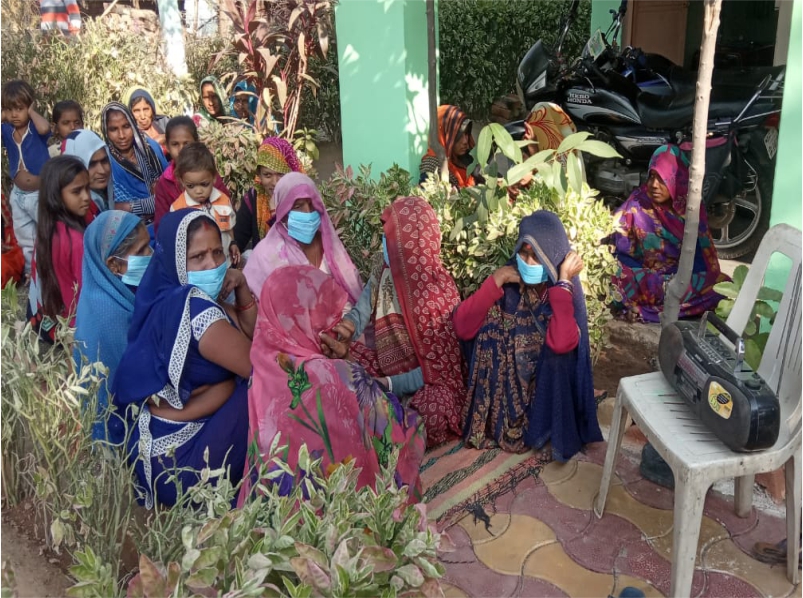|
ShubhKal Campaign: Climate Change Communication and Outreach through Community Radio Stations
In pursuit of the mission to create sustainable livelihoods, Development Alternatives has always focused on Bundelkhand in Central India. Bundelkhand is a microcosm of the Indian rural economy, one of India’s most drought prone and poverty ridden regions more affected by climate change. With illiteracy being rampant, people here have an extremely low climate change risk perception and are resistant to change. For this reason, the initiatives have been taken towards conserving and sustainably managing water resources for human and livestock consumption, economic development and ecosystem health, climate adaptive planning for rural areas and building resilience through land water management, livelihood diversification and strengthening governance institutions. And, most importantly, behaviour change towards the climate change risk perception and tackling the resistance to change.
 In order to combat this, one of DA’s innovative solutions is Radio Bundelkhand, a community-owned and -produced radio station dedicated to the concerns of rural communities in Bundelkhand region of Madhya Pradesh and Uttar Pradesh. Radio Bundelkhand was established in Tikamgarh district of Madhya Pradesh in October 2008 as the country’s second community radio station. Since then, it has played an important role in bringing about social and long-term changes in Bundelkhand region. It is a popular, cost-effective, and non-literate-friendly communication medium and follows the participatory and collaborative approach to empower and build consensus for change. Through community radio, vital dialogues are facilitated among communities, scientists and policy-makers on climate change issues, strengthening community knowledge and voices on the impacts.
In order to combat this, one of DA’s innovative solutions is Radio Bundelkhand, a community-owned and -produced radio station dedicated to the concerns of rural communities in Bundelkhand region of Madhya Pradesh and Uttar Pradesh. Radio Bundelkhand was established in Tikamgarh district of Madhya Pradesh in October 2008 as the country’s second community radio station. Since then, it has played an important role in bringing about social and long-term changes in Bundelkhand region. It is a popular, cost-effective, and non-literate-friendly communication medium and follows the participatory and collaborative approach to empower and build consensus for change. Through community radio, vital dialogues are facilitated among communities, scientists and policy-makers on climate change issues, strengthening community knowledge and voices on the impacts.
The ‘ShubhKal Campaign’ was launched to strengthen the understanding of and bridging the information gap about emerging climate science and research among communities and communicators, by exploring community radio as a medium for disseminating climate change messages and sharing farming communities’ experiences of adapting to climate change and resilient actions. Radio is still the dominant media format among poorer communities in rural India. Capitalising on the reach and influence of existing community radio stations and information networks in Bundelkhand, ShubhKal has built the capacity of local radio stations to broadcast about climate issues, adaptation options and relevant government schemes to farming communities in an accessible way. At the same time, the radio stations learnt to provide a platform for communities to share their experiences with scientists and decision-makers. Alongside capacity building of radio journalists, ShubhKal has produced research examining channels for communicating climate change information to farming communities and their information knowledge needs.
 For many villages in Bundelkhand, the ShubhKal radio shows are currently the only source of information on climate change impacts and adaptation options. Many farmers that were interviewed said they had begun to apply some of the adaptation techniques in their work, and have become proactive in seeking solutions to the problems posed by climate change. These include the adoption of various measures in combination such as planting saplings, rainwater conservation, meddling the field, construction and rejuvenation of ponds, farm ponds, check dams and building dams for water conservation, forest conservation, soil and water conservation, which were shared during the radio programmes. Farmers have reported these measures have led to savings which could be spent elsewhere.
For many villages in Bundelkhand, the ShubhKal radio shows are currently the only source of information on climate change impacts and adaptation options. Many farmers that were interviewed said they had begun to apply some of the adaptation techniques in their work, and have become proactive in seeking solutions to the problems posed by climate change. These include the adoption of various measures in combination such as planting saplings, rainwater conservation, meddling the field, construction and rejuvenation of ponds, farm ponds, check dams and building dams for water conservation, forest conservation, soil and water conservation, which were shared during the radio programmes. Farmers have reported these measures have led to savings which could be spent elsewhere.
As the campaign has been delivered through community radios, it has the potential to expand rapidly. A networked approach taken by DA allows for the intervention to be scaled out without losing the relevance. Through the identification of other local stakeholders, new strategic partnerships have been established to facilitate expansion. Further, an e-platform and a mobile application that are created ensure replicability. The smartphone application has been pushed frequently on radio shows and social media pages, and many people of the community have downloaded it as a result. For the same purpose, tool kits in the form of training modules on climate change, radio guides on climate reporting and a self-learning interactive e-platform, ‘Jalvayu Pitara’ are developed. Thus, it has created a space of co-learning where stakeholders have developed an understanding on the sensitive issues like climate change, its impacts and the adaptive practices.
■
Vineeta Khatri
vkhatri@devalt.org
Back to Contents
|
 In order to combat this, one of DA’s innovative solutions is Radio Bundelkhand, a community-owned and -produced radio station dedicated to the concerns of rural communities in Bundelkhand region of Madhya Pradesh and Uttar Pradesh. Radio Bundelkhand was established in Tikamgarh district of Madhya Pradesh in October 2008 as the country’s second community radio station. Since then, it has played an important role in bringing about social and long-term changes in Bundelkhand region. It is a popular, cost-effective, and non-literate-friendly communication medium and follows the participatory and collaborative approach to empower and build consensus for change. Through community radio, vital dialogues are facilitated among communities, scientists and policy-makers on climate change issues, strengthening community knowledge and voices on the impacts.
In order to combat this, one of DA’s innovative solutions is Radio Bundelkhand, a community-owned and -produced radio station dedicated to the concerns of rural communities in Bundelkhand region of Madhya Pradesh and Uttar Pradesh. Radio Bundelkhand was established in Tikamgarh district of Madhya Pradesh in October 2008 as the country’s second community radio station. Since then, it has played an important role in bringing about social and long-term changes in Bundelkhand region. It is a popular, cost-effective, and non-literate-friendly communication medium and follows the participatory and collaborative approach to empower and build consensus for change. Through community radio, vital dialogues are facilitated among communities, scientists and policy-makers on climate change issues, strengthening community knowledge and voices on the impacts.
 For many villages in Bundelkhand, the ShubhKal radio shows are currently the only source of information on climate change impacts and adaptation options. Many farmers that were interviewed said they had begun to apply some of the adaptation techniques in their work, and have become proactive in seeking solutions to the problems posed by climate change. These include the adoption of various measures in combination such as planting saplings, rainwater conservation, meddling the field, construction and rejuvenation of ponds, farm ponds, check dams and building dams for water conservation, forest conservation, soil and water conservation, which were shared during the radio programmes. Farmers have reported these measures have led to savings which could be spent elsewhere.
For many villages in Bundelkhand, the ShubhKal radio shows are currently the only source of information on climate change impacts and adaptation options. Many farmers that were interviewed said they had begun to apply some of the adaptation techniques in their work, and have become proactive in seeking solutions to the problems posed by climate change. These include the adoption of various measures in combination such as planting saplings, rainwater conservation, meddling the field, construction and rejuvenation of ponds, farm ponds, check dams and building dams for water conservation, forest conservation, soil and water conservation, which were shared during the radio programmes. Farmers have reported these measures have led to savings which could be spent elsewhere.